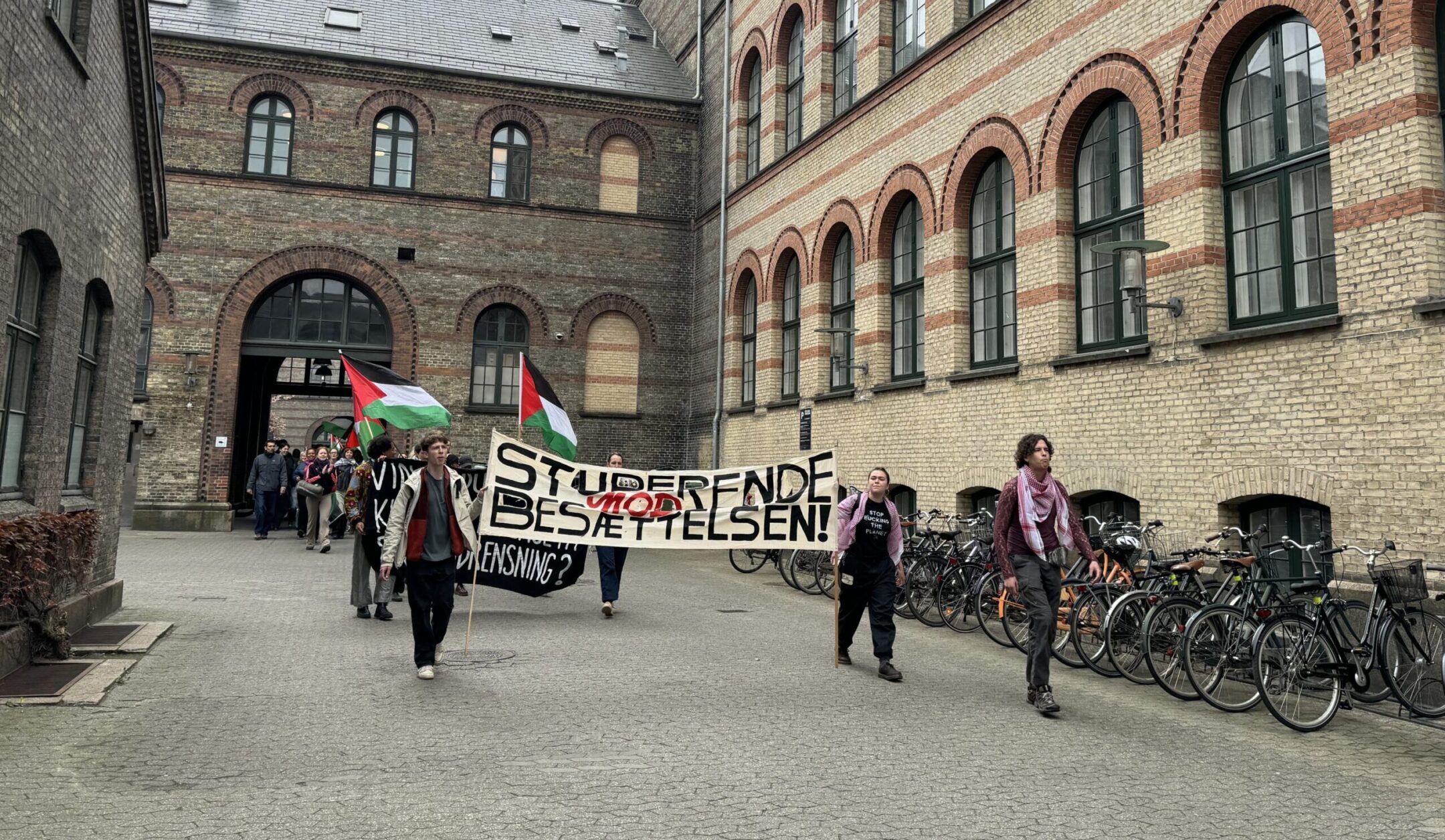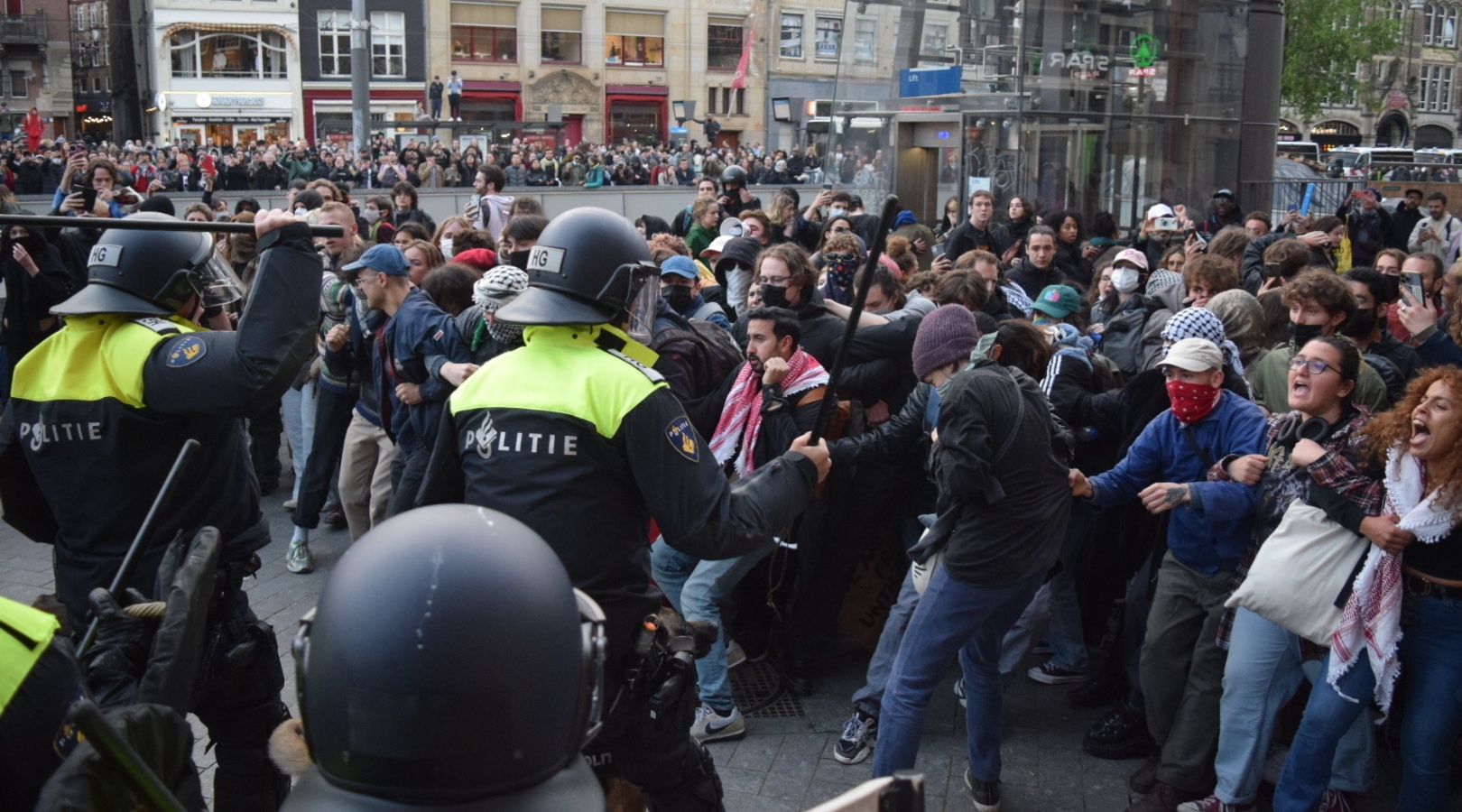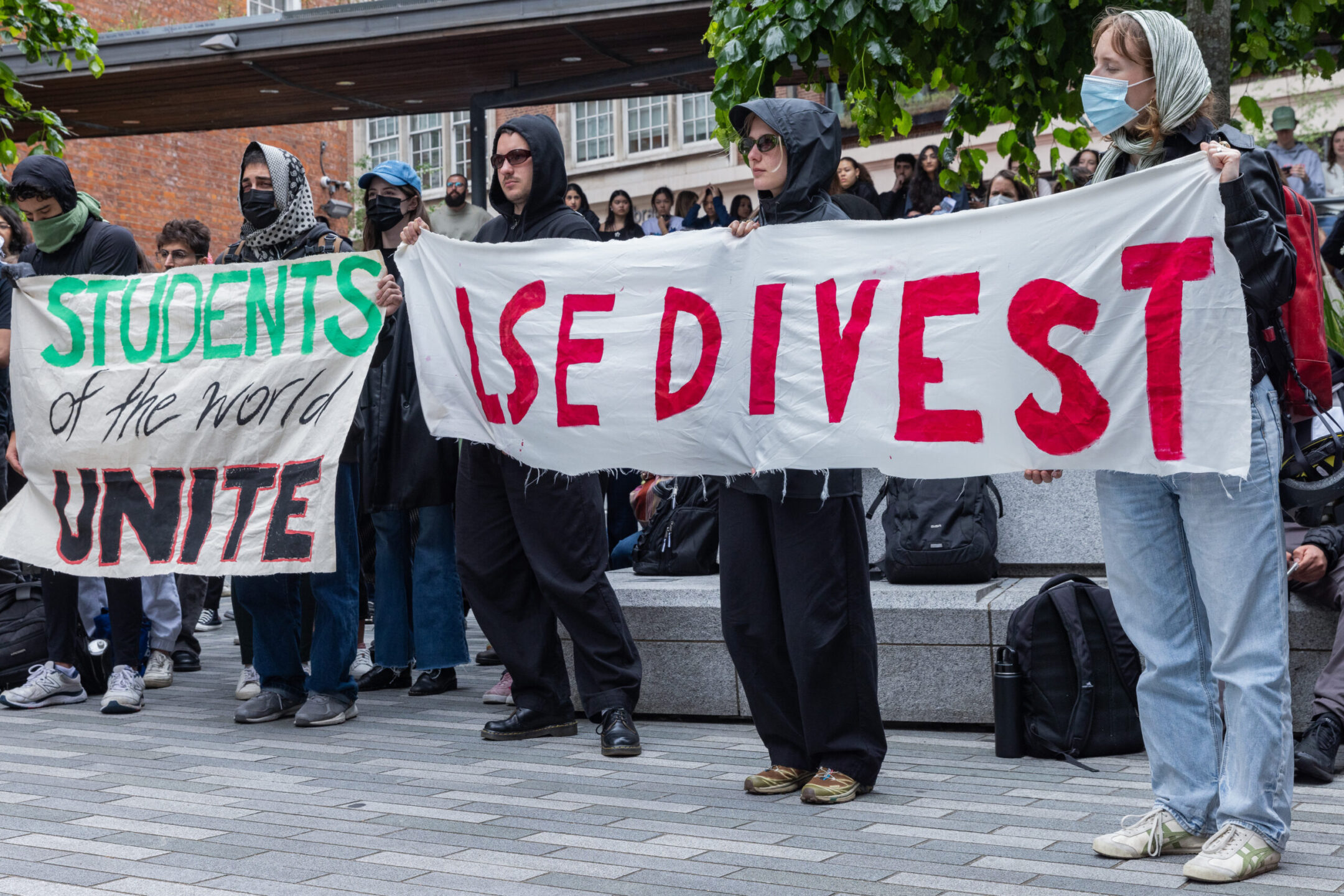European students are calling on their colleges to divest from Israel. In many cases, they’re winning.
European students have been far more successful than the U.S. activists from whom they drew inspiration

Trinity College in Dublin is divesting from Israel after a student protest there, May 8, 2024. (Niall Carson/PA Images via Getty Images)
MADRID (JTA) — After weeks of campus protests at the University of Copenhagen, hundreds of students won their demand last week: a halt to the school’s investment in companies that operate in the Israeli-occupied West Bank.
The university said on May 28 that it will divest its holdings worth 1 million Danish Krone, about $145,500, in Airbnb, Booking.com and eDreams, which appear on a U.N. list of businesses with activities in the West Bank. The University of Copenhagen has a yearly revenue of over 10 billion Danish Krone, or $1.5 billion.
It’s the latest in a crop of universities across Europe — including schools in Spain, Ireland, Norway, the Netherlands, Belgium and the United Kingdom — that have agreed to divest from Israel-linked companies or boycott Israeli institutions. The policy changes ride a wave of student protests against Israel’s eight-month war in Gaza, a military response to Hamas’ Oct. 7 attack on Israel that has killed over 36,000 Palestinians and inflamed global opinion.
Europe’s student activists took inspiration from the United States, where a spate of pro-Palestinian demonstrations and encampments roiled campuses this spring. But compared with U.S. students, protesters in Europe have won more concessions from their universities.
That’s partly because European universities face less of the legal, political and cultural pressure on U.S. universities, according to Suzanne Whitten, a political theory lecturer at Queen’s University Belfast. U.S. politicians have called university leaders to account in Congress for their handling of protests, leading to the ousting of some. Thirty-eight states have laws that discourage boycotts of Israel. And U.S. universities rely more on private donors than universities in Europe, including some who say they are withdrawing gifts to their alma maters over the protests.
“The market-driven higher education system in the U.S. has produced a climate where universities face immense scrutiny from donors, politicians and students as paying customers,” Whitten told the Jewish Telegraphic Agency. “The U.S. is also highly litigious, takes equality policy and legislation very seriously, and has a very strong relationship politically with Israel that just isn’t there in the same way with European institutions.”

Students of Copenhagen University start an encampment asking for the university administration to cut ties with Israel due to its military offensive in Gaza, May 6, 2024. (Mohamed El Shemy/Anadolu via Getty Images)
The U.S. movement has been marked by crackdowns from university administrators and police at dozens of campuses, including evictions, suspensions and more than 2,900 arrests nationwide. A few schools have allowed students to continue protesting or even agreed to negotiate with them. At universities including Brown, Harvard, Northwestern and Rutgers, administrators have cut deals to disclose investments or review students’ proposals in exchange for ending their encampments.
But no university in the United States has said it will sever ties with Israel, and many have explicitly said they will not divest. At Sonoma State University, President Ming-Tung “Mike” Lee announced a decision to pursue divestment and an academic boycott of Israeli universities. He was suspended for “insubordination” within 24 hours and retired the next day.
Meanwhile, a growing number of European universities have met the demands of student protesters.
Ireland’s Trinity College Dublin also acquiesced to student protesters on May 8 after an encampment blocked entrance to the Book of Kells, a medieval manuscript and major attraction for paying tourists. The school said it would divest from the one Israeli company on its supplier list.
Spain has seen a particularly strong embrace of the student movement. The Conference of Rectors of Spanish Universities, or CRUE — representing 76 private and public universities — promised on May 9 to review agreements with Israeli academic institutions and suspend collaboration with any that “have not expressed a firm commitment to peace and compliance with international humanitarian law.” Since then, universities in Granada, Oviedo and Barcelona have cut ties.
In Norway, five universities suspended their ties with Israeli universities as early as February.
It’s no coincidence that some of the schools fastest to issue boycotts and divestment are in Belgium, Spain, Ireland and Norway, Whitten said. The governments of those countries are among Israel’s most vocal critics in Europe, with the latter three formally recognizing a Palestinian state on May 28 following a campaign by Spain’s president.
“In general, those countries where governments have spoken out against Israel appear to be more likely to meet student demands,” said Whitten. “One reason for this may be that they are less worried about sanction or scrutiny from the government. Another might be that there will be less backlash from the surrounding public in that country.”
Protesters have not been as successful in Germany and France, whose governments align more closely with Israel. Universities in Berlin and Paris have called in police to end student demonstrations. German leaders in particular have argued they hold a special responsibility toward Israel, calling Israel a “reason of state” for Germany because of its history of the Holocaust.
Still, student movements have continued to achieve policy shifts in other parts of Europe. Last week, the Université Libre de Bruxelles joined three other Belgian universities that have ended or committed to review ties with Israeli institutions. The ULB said it was suspending ties with both Israeli and Palestinian universities until their respective authorities committed to the demands of the International Court of Justice and until the unconditional release of Israeli hostages.
And although the Netherlands saw clashes between protesters and riot police at the University of Amsterdam, the Royal Academy of Art in The Hague became the country’s first university to institute an academic boycott by severing its relationship with the Israeli Bezalel Academy of Arts and Design.

Police face pro-Palestinian protesters at the University of Amsterdam, May 8, 2024. (Mouneb Taim/Anadolu via Getty Images)
In the United Kingdom, Goldsmiths University of London agreed to student demands that included reviewing its investment policy, expanding scholarships for Palestinian students and renaming a building after Palestinian journalist Shireen Abu Akleh. (A handful of U.S. schools have agreed to similar demands.) The University of York said it would divest from arms manufacturers.
Many European Jewish students oppose divestment and boycott measures, said Emma Hallali, president of the European Union of Jewish Students, which represents 160,000 Jews across 36 European countries. While these Jewish students embody a range of political opinions and views on Israel, Hallali said she hears a pervasive sentiment that their universities have responded to protesters’ demands without addressing a rise in campus antisemitism. An EUJS report in February found 110 antisemitic incidents at European universities since Oct. 7, with 32% tied to in-person harassment and physical violence.
In both Europe and the United States, some protests have featured threatening behavior targeted at Jewish students, though it is not always clear if the actors are classmates or non-student protesters. But Jews are a larger minority at many U.S. campuses, comprising more than 20% of the student body at Columbia, Cornell and Brown, and some Jewish students count among the protesters at U.S. universities — such as those represented by the anti-Zionist group Jewish Voice for Peace. In Europe, home to less than 10% of the world’s Jews, Jewish students are almost always isolated on their campuses.
“The diversity, equality and inclusion offices of universities are supposed to be protective of their Jewish students, like any minority,” Hallali told JTA. “Jewish students are always less than 10% of the universities in Europe. [Diversity] offices and universities are just not protecting them, so those students are fearing to go to school, they are fearing for their safety.”

Students from the London School of Economics Student Union Palestine Society hold a press conference and rally to launch a divestment campaign, May 14, 2024 in London. (Mark Kerrison/In Pictures via Getty Images)
Another hurdle faces student activists in the United States, according to Robert Cohen, who studies higher education and social protest at New York University: Their movement is unpopular — and not just because of U.S. views on the Israeli-Palestinian conflict.
“Student movements in the United States are never popular, it doesn’t matter the issue,” he said. “Even as the country eventually, by 1968, started turning against the Vietnam War — the war was unpopular, but the anti-war movement was even more unpopular than the war.”
A poll conducted last month found that more than half of Americans said they opposed “the student protests being held on college and university campuses responding to Israel’s actions in Gaza.”
Student protests in Europe spurred lasting social change and served as a front-line defense against fascist governments during the 20th century. That has translated into greater cultural tolerance for youth protests than in the United States on top of support for the Palestinians, according to Jordi Mir Garcia, a historian at the Pompeu Fabra University and the Autonomous University of Barcelona.
“The university movement in the ’60s and ’70s, during the dictatorship of [Francisco] Franco, was fundamental to the crisis of the dictatorship” in Spain, said Mir Garcia. “In the ’70s and early ’80s, the student movement was thought of as a positive movement against the dictatorship. Some people, especially on the right wing, are critical of student movements, but I think in general the society has a positive view of them — and now also, because some people think it’s necessary to do something.”
This article originally appeared on JTA.org.















